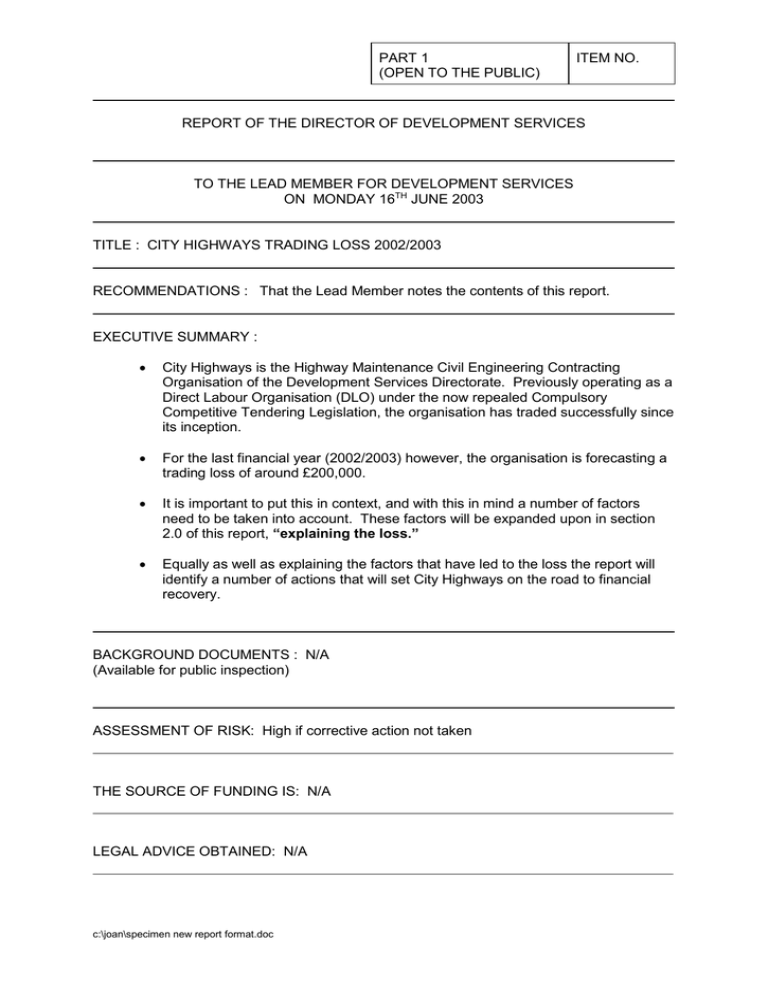PART 1 ITEM NO. (OPEN TO THE PUBLIC)
advertisement

PART 1 (OPEN TO THE PUBLIC) ITEM NO. REPORT OF THE DIRECTOR OF DEVELOPMENT SERVICES TO THE LEAD MEMBER FOR DEVELOPMENT SERVICES ON MONDAY 16TH JUNE 2003 TITLE : CITY HIGHWAYS TRADING LOSS 2002/2003 RECOMMENDATIONS : That the Lead Member notes the contents of this report. EXECUTIVE SUMMARY : City Highways is the Highway Maintenance Civil Engineering Contracting Organisation of the Development Services Directorate. Previously operating as a Direct Labour Organisation (DLO) under the now repealed Compulsory Competitive Tendering Legislation, the organisation has traded successfully since its inception. For the last financial year (2002/2003) however, the organisation is forecasting a trading loss of around £200,000. It is important to put this in context, and with this in mind a number of factors need to be taken into account. These factors will be expanded upon in section 2.0 of this report, “explaining the loss.” Equally as well as explaining the factors that have led to the loss the report will identify a number of actions that will set City Highways on the road to financial recovery. BACKGROUND DOCUMENTS : N/A (Available for public inspection) ASSESSMENT OF RISK: High if corrective action not taken THE SOURCE OF FUNDING IS: N/A LEGAL ADVICE OBTAINED: N/A c:\joan\specimen new report format.doc FINANCIAL ADVICE OBTAINED: Yes CONTACT OFFICER : Bill Taylor Tel: 0161 793 3603 WARD(S) TO WHICH REPORT RELATE(S): All wards KEY COUNCIL POLICIES: City Council Revenue Budget DETAILS 1.0 Explaining the Loss 1.1 To fully understand the background to the operating loss incurred in the last financial year, there is a need to look back over the preceding five to six years to identify changing trends. 1.2 There are a number of factors that have contributed to the loss and these are highlighted below: The changing nature of workload The inflation mechanism The effects of the Single Status Agreement Charging for dayworks Chapter 8 Use of Highway Management Tender rates for none highway works by other Directorates Plant, Haulage and stores issues Financial Management information issues Industry recruitment and retention issues Sickness absence levels The following paragraphs will explain how the above changes have had an adverse affect on the successful operation of the organisation, and have eroded the safeguards that any healthy organisation needs to remain in profit. 1.3 Whilst it is fair to say that all of the above factors have had an effect on the trading position of the service, there are four main negative contributors, these are:- the effects of the single status agreement, a dramatic rise in sickness absence levels, outstanding income and the changes to the relationship between planned and reactive works. 1.4 In taking these factors together it is important to note that they have had an impact on the output per employee, which has had the effect of reducing productivity. As Lead Member will be aware the Directorate employed Accord plc to look at the operation of the service to identify areas for improvement. This has entailed a detailed look at the way the work is organised, the workforce deployed and systems and procedures that back them up. Accord have estimated that the reduced productivity for the workforce brought about by single status, sickness, and the changed relationship between planned and reactive work has had a negative affect of around £130,000 per annum. c:\joan\specimen new report format.doc 1.5 The other major factor is potential income not recovered. Invoices have been sent for around £73,000, which at the time of closure of the accounts had not been paid. Since then £25,000 has been recovered and has been brought in against this years accounts and the outstanding balance £48,000 is still being pursued. 1.6 The above factors account for the shortfall in income. 2.0 Planned Remedial Actions 2.1 The losses that have been accrued through the implementation of the single status agreement can be immediately and simply corrected. This will mean increasing rates to cover the cost of lost productivity brought about by increased annual leave, the effects of family friendly policies and the reduced working week. 2.2 There are some factors to consider when increasing rates, and these should not be taken lightly. Firstly there is the issue of the trading position of the service relative to alternative service suppliers and secondly the fact that from a service perspective, increased rates means less actual work for the budget available. 2.3 In terms of the trading position the increase in rates will still leave “in house” rates cheaper than that of alternative providers. This has been checked as a recent procurement exercise has been carried out where a number of activities have been tendered and let on a sub contract basis to private sector contractors. Even allowing for the increase in rates brought about to ensure City Highways does not make a loss this year, the new rates to be applied, whilst closer to private sector rates, are still cheaper. 3.0 Conclusions 3.1 If the issue of outstanding invoices are taken into account then the loss for the year can be viewed as around £130,000. As explained this can be simply accounted for through the effects of implementing single status, increased sickness and a changing mix in work. 3.2 All of the above factors have now been rectified through changes to the schedule of rates, and a concerted effort to address the sharp rise in sickness absences. 3.3 To put the issue in to context the actual loss, through reduced productivity, is around £130,000, on a turnover of £5,500,000. The aim of City Highways for the past 5 or 6 years has been to keep as close to break even (ie not accrue profits) as possible. The logic behind this being that from a service perspective, taking profits from a seriously under-funded highway maintenance budget results in those profits not being spent on much needed repairs to the highway. All steps have been taken to ensure City Highways do not make a loss in the current financial year. A report on this years trading position will be produced for Lead Member in July, and regular updates will be produced throughout the year. Malcolm Sykes Director of Development Services c:\joan\specimen new report format.doc


